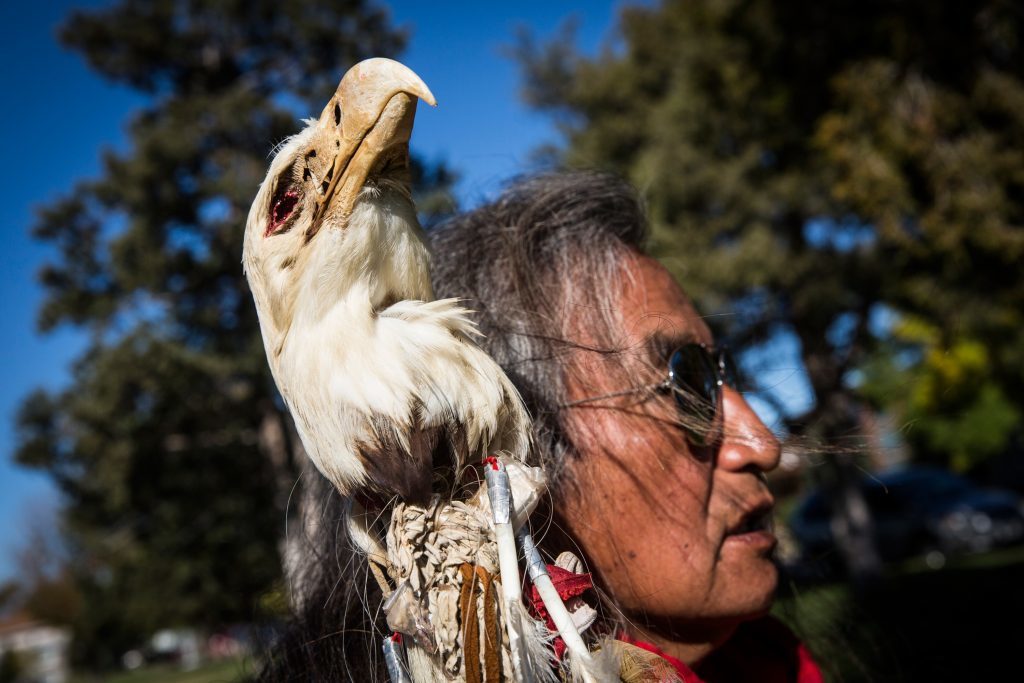
After months of fighting against the Dakota Access oil pipeline, Standing Rock Sioux Tribe chairman Dave Archambault II boarded a plane to Washington to meet with the Trump administration and voice his opposition. Before he had landed, news had broken that the U.S. was clearing the project.
The U.S. Army Corps disclosed in a filing Tuesday that it would grant the final easement Energy Transfer Partners LP needed to finish building the pipeline in North Dakota and issued the actual permit Wednesday. The chairman canceled his meeting with administration officials after learning of the decision, the tribe said in a statement.
Just two weeks ago, White House Press Secretary Sean Spicer said President Donald Trump was “going to make sure he is working with all parties involved” in the $3.8 billion project. Dakota Access has been the subject of heated protests and months-long campouts by tribes and environmentalists, emerging as a battleground in the broader war over new oil and natural gas pipelines.
“The president has shown through his business life that he knows how to negotiate a great deal,” Spicer said during a press briefing on Jan. 24. “He’s willing to sit down with all of the individuals that are involved in the Dakota pipeline to make sure it’s a deal that benefits all of the parties of interest, or at least gets them something that they want.”
Archambault said in the tribe’s statement that Trump has instead shown a “complete disregard for Native Nations and our treaty rights.”
The White House didn’t immediately respond to a request for comment. Energy Transfer said late Wednesday that the easement will allow it to bring Dakota Access into service in the second quarter and access a remaining $1.4 billion in financing for the project and $1.2 billion from closing a stake sale to Enbridge Inc. and Marathon Petroleum Corp.
Trump, who has vowed to support the oil and gas industry and promote new infrastructure, signed a memorandum last month advising that approval of the project be expedited. That came to fruition on Wednesday when the Army granted Energy Transfer the easement to finish the line. Work on the project had been stalled since September, when the Obama administration said it needed to reconsider prior decisions to allow the project.
Trump’s approval is a blow to opponents who argued the pipeline would damage sites that are culturally significant to Native Americans and pose an environmental hazard where it crosses the Missouri River.
Standing Rock said it will challenge the decision in court and will continue to oppose the project.
Spicer also said on Jan. 24 that Trump had directed the Commerce Secretary to lead a study that would look into building both Dakota Access and the Keystone XL oil pipeline using U.S.-made steel. While the majority of the Dakota Access pipeline was made using U.S.-manufactured products, Energy Transfer spokeswoman Vicki Granado declined to comment specifically on the remaining section of the pipeline and whether it was U.S.-sourced.
The Indigenous Environmental Network, in solidarity with the Standing Rock tribe, called for protests against Dakota Access on Wednesday, in cities ranging from Washington D.C. to Denver. The group said hundreds of people had rallied outside the White House.
Trump won’t build the pipeline “without a fight,” Tom Goldtooth, director of the network, said in a statement Tuesday. “Expect mass resistance far beyond what Trump has seen so far.”